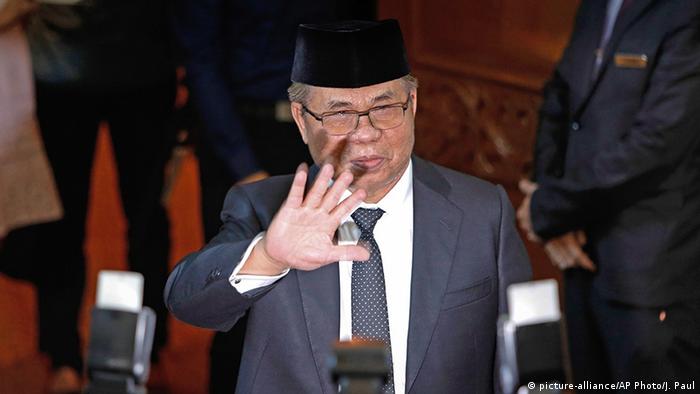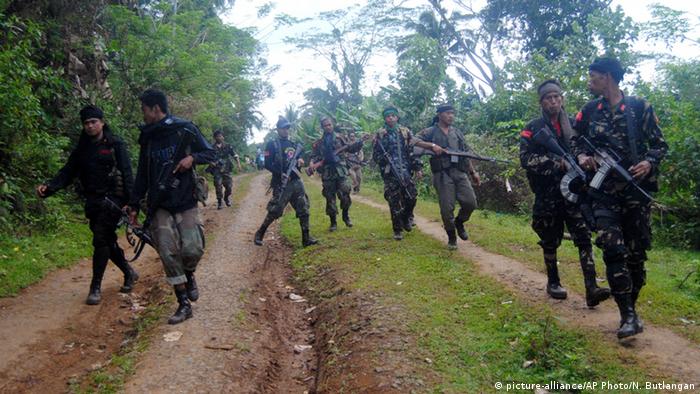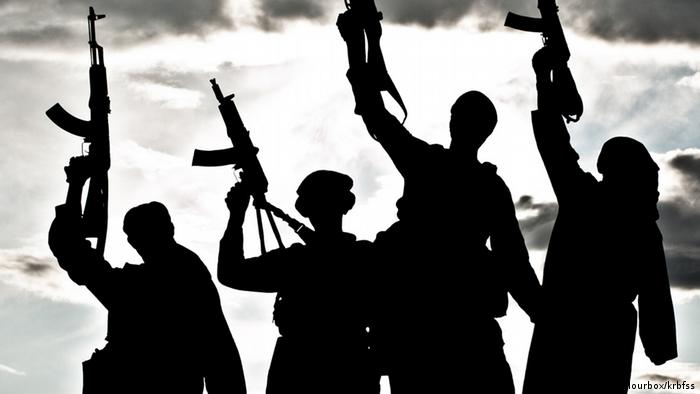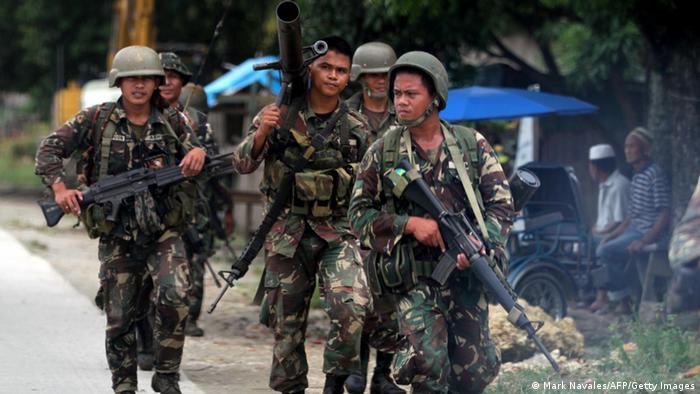A leading security analyst believes the Philippine government is underestimating an emerging terror threat as local militant groups pledge loyalty to 'IS.' But other analysts view their allegiance as purely 'symbolic.'
After last week's release of video footage purporting to show several Philippine Islamist factions pledging their allegiance to the "Islamic State" (IS) militant group, one terrorism expert predicts the Middle East-based network is close to declaring their first satellite province in Southeast Asia.
Dr Rohan Gunaratna, who heads of the International Centre for Political Violence and Terrorism Research, said 'IS' intends to "enforce its strict laws and code of conduct" in the southern Sulu archipelago, where the majority of the Philippines' roughly six million-strong Muslim population lives.
"Regional governments are very worried that with the declaration of an "IS" branch in the southern Philippines the group will start to train militants from around the region, and thus expand the threat," Gunaratna told DW.
He pointed to a "lack of political will" on the part of Philippine leaders to "dismantle the emerging IS infrastructure."
"Being an election year, I doubt very much that the president will take a decision to send additional troops to the region," the analyst predicted. The presidential poll is scheduled for May 9 and incumbent Benigno Aquino III is barred from seeking re-election.
An uncertain threat
Despite Gunaratna's warnings, some other regional security analysts are less concerned over whether "IS" can realistically take a foothold in the region.
"I am not sold on the idea that 'IS' will declare a caliphate soon," Joseph Raymond Silva Franco, associate research fellow at Singapore's Nanyang Technological University, told DW. Franco said reports of a loyalty pledge by Philippine militants came from a Russian-language "IS" magazine, which he described as being run by so-called "jihobbyists."
Similarly, Manila-based analyst Dr Steven Rood believes there is "no evidence of any operational connection" between rebel groups in the southern Philippines and "IS." He is hopeful that the military can limit "accidental clashes" with rebel groups and "avoid civilian casualties."
"A declaration of a province in the south would be, at the outset at least, purely symbolic rather than ushering in a different tenor to the terrorism/counter-terrorism dynamic," said Rood, who is the Philippines' Country Representative of US-funded The Asia Foundation.
Muslim chiefs worried
But Gunaratna's concern has been backed up by the head of the Moro Islamic Liberation Front (MILF), which fought a nearly four decade-long insurgency on the southern island of Mindanao, seeking an autonomous region for Muslims.
Murad Ebrahim warned, on the sidelines of peace talks in the Malaysian capital Kuala Lumpur on Monday, that "IS" was seeking a stronghold in the South.

Murad Ebrahim, chairman of the MILF, the biggest Muslim group in the region, predicts the advance of "IS".
"After the non-passage of the peace (bill), we are quite concerned they ("IS") can capitalize on this because the (frustration) of the people in the area is now very strong," Murad was quoted by local media as saying.
Peace agreement stalled
Security analysts told DW the delayed progress of the Bangsamoro Basic Law (BBL), which enshrines Mindanao's autonomy, is linked to a recent return to violence in the region.
Describing MILF as "far from a homogenous organization," NTU's Franco said they "could be raising the threat profile of 'IS' to push the speedy passage of the BBL."
Another possibility, he added, is that a faction of MILF, which is known to be an extortion ring, could be pushing the rhetoric about links to "IS" to inflate its own reputation among the local population. "Would you pay extortion to a two-bit amateur ring or to a group linked with big bad IS?" Franco said.

The Moro Islamic Liberation Front (MILF) signed a peace deal with the government in 2013 and renounced violence.
Franco told DW that 60 percent of the Armed Forces of the Philippines' (AFP) units and assets are already deployed in Mindanao. Moreover, special operations forces have already inflicted "heavily casualties" on groups claiming to be aligned with "IS," including Ansarul Khilafah and the Maute Group, he added.
'Prepare for attacks'
But Gunaratna maintains that the terror threat in Southeast Asia has moved from an al-Qaeda-centric landscape - responsible for the 2002 Bali bombings and the Jakarta attacks of 2003 and 2009 - to a more "IS"-centric threat.
"Certainly, the creation of an 'IS' nucleus in the southern Philippines would have implications for the security and stability of the entire region," he told DW, adding that Mindanao has historically been the training ground for regional militant groups.
Singaporeans, Thais, Malaysians and Indonesians have all trained there, he said.
"With the (coming) declaration of an 'IS' branch in the region, the fear is that they will also start to train militants from the region. If they are able to sustain themselves and create the necessary infrastructure, they could carry out bombings in Malaysia and the Philippines," Gunaratna said.
'All sides must push for peace'
Other analysts believe the peace deal between the government and the MILF will continue to be central to maintaining regional security.
"Groups sympathetic to 'IS' do not yet lead public opinion in southern Mindanao, and with sensitive and sincere efforts to address legitimate grievances of Muslims in the Philippines, hopefully such opinions will never lead," said The Asia Foundation's Rood.
Meanwhile Franco called on local Muslim leaders to prevent the region from once again descending into conflict.
"The MILF remains the biggest group out there. For them to be credible they must demonstrate that they can actually hold sway over the territories they occupy.
Otherwise, this Bangsamoro deal will be like 1996 all over again," referring to a period when the MILF refused a peace offer, which led to an intensification of the insurgency.
http://www.dw.com/en/islamic-state-masterplan-for-base-in-philippines-not-being-taken-seriously/a-19103816



No comments:
Post a Comment
Note: Only a member of this blog may post a comment.